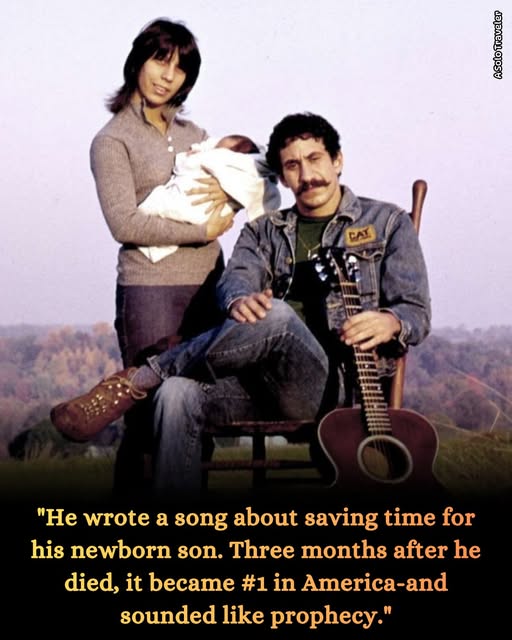
He wrote a song about saving time for his newborn son. Three months after he died, it became #1 in America—and sounded like prophecy.
September 1971. Jim Croce held his newborn son for the first time, feeling the impossible weight of something so small. A.J. was tiny, perfect, and entirely dependent on a father who was rarely home.
Jim sat down with his guitar, thinking about all the moments he would miss—first steps, first words, bedtime stories. The road had always called him away. Music demanded everything. But now, holding this child, Jim wanted something music had never given him: time.
He began to write.
“If I could save time in a bottle…”
The melody came gently, like a lullaby. The words were a father’s wish—impossible and tender. He wanted to save every moment, to make days last forever, to somehow stop the clock that kept pulling him away.
“It was a prayer more than a song,” his wife Ingrid later said.
Jim Croce understood time’s cruelty better than most. He’d spent years chasing an impossible dream while time kept running out.
The Long Road Before the Music
For years before fame found him, Jim Croce lived the hard, ordinary life he would later sing about.
He hauled lumber. He drove trucks. He taught at small colleges. Anything to keep the lights on while pursuing music that nobody seemed to want.
He played in smoky bars where drunks talked over his songs. He packed up his guitar at 2 a.m. and drove home alone, wondering if any of it mattered.
“Every song I write is like a little movie,” he once said. “Only mine end in diners and bars instead of sunsets.”
His songs were filled with characters America would later love: dreamers in dive bars, hustlers with bad reputations, telephone operators connecting desperate calls, ordinary people living fragile lives.
But in 1972, something shifted.
When Lightning Finally Struck
You Don’t Mess Around with Jim hit the radio like a warm breeze through a cold life. America recognized something in him—that lived-in poetry of a man who’d seen the hard parts and still found something beautiful to sing about.
Operator (That’s Not the Way It Feels) broke hearts across the country.
Bad, Bad Leroy Brown made jukeboxes roar in every small town.
For the first time in his life, Jim Croce wasn’t just surviving. He was soaring.
But fame, for Jim, was no home. The stages were loud, the crowds were large, but he was tired. Tired of motel rooms. Tired of being away from Ingrid and A.J. Tired of missing his son’s childhood for three-minute songs.
He wrote letters home from the road: “I’m tired of being away from you and the boy. When this tour ends, I’m coming home for good.”
He was thirty years old and ready to trade stages for peace. Just one more tour. Then home. Then time—finally, enough time.
He Never Made It Home
September 20, 1973. Natchitoches, Louisiana.
Jim had just finished a concert at Northwestern State University. The crowd had loved him. He was exhausted but satisfied. One more show, then a few more, then home.
He boarded a small charter plane with five others—his guitarist Maury Muehleisen, their road manager, the pilot, and two others.
Minutes after takeoff, the plane struck a pecan tree in the darkness.
It fell from the sky.
Everyone aboard was killed instantly.
A silence followed that no radio could fill.
When Time Ran Out, The Song Began
“Time in a Bottle” had been recorded in 1972 but was never released as a single. It sat quietly on an album, a gentle song overshadowed by louder hits.
After Jim’s death, a movie director used the song in a television film. Radio stations began playing it. Listeners heard the lyrics differently now.
“If I could save time in a bottle…
If I could make days last forever…
If words could make wishes come true…”
Three months after Jim Croce died, “Time in a Bottle” reached #1 in America in December 1973.
The song he’d written for his son—a father’s wish for more time—became an anthem for everyone who’d ever lost someone too soon.
The lyrics, once a lullaby, now sounded like prophecy.
The Echo That Never Stops
Jim Croce never got more time. But somehow, he gave it to everyone else.
His songs play in kitchens where couples slow dance. They hum from car radios on long drives through small towns. They speak to anyone who’s ever wished for one more day, one more moment, one more chance to say what matters.
His son, A.J. Croce, grew up to become a musician himself—carrying forward the music his father left behind. The boy Jim wrote “Time in a Bottle” for now plays his father’s songs, keeping the melody alive.
Jim sang for the ordinary dreamer, the struggling artist, the father who wanted to come home. Though his clock stopped too soon, his voice kept ticking—soft, steady, eternal.
The Lesson in the Song
“Time in a Bottle” reminds us that we never have as much time as we think we do.
Jim Croce spent years struggling toward success. When it finally came, he was ready to leave it behind for something more important: being present for the people he loved.
He didn’t get that chance.
But his song became a gift to everyone who hears it—a reminder not to wait. Not to assume there will always be tomorrow. Not to trade what matters most for what merely seems urgent.
Jim Croce proved that a man doesn’t need a long life to leave a long echo—just a guitar, a few true words, and the courage to sing them before the music stops.
He wanted to save time in a bottle for his son.
Instead, he saved a moment for all of us—a three-minute reminder that time is the one thing we can never get back.
So we’d better use it while we have it.
